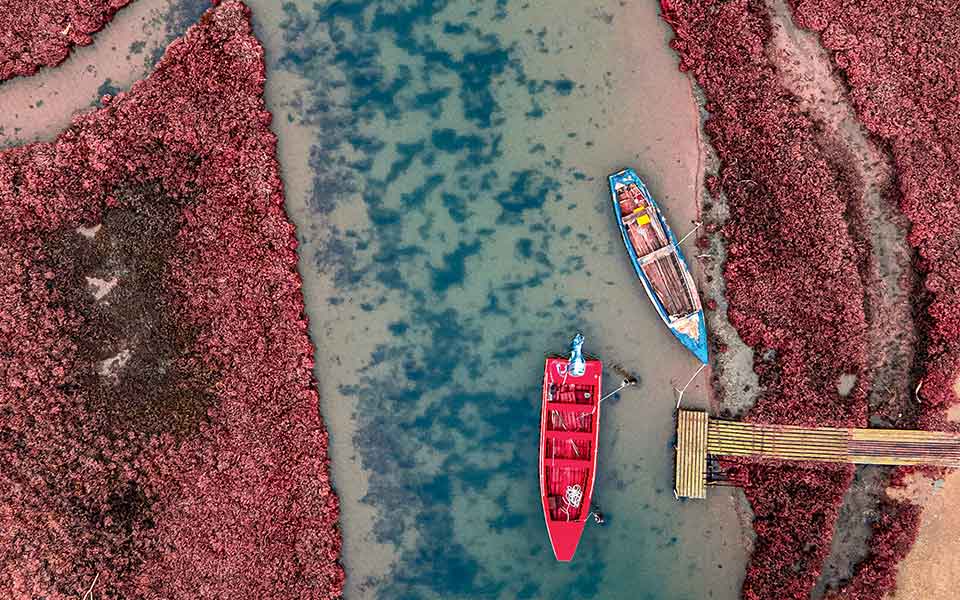Camouflage. The river, the flora, the fishermen, and the border guards are all khaki in the Evros Delta. Birds, reptiles, fish, hunters, and migrants, they all need to hide in treacherous marshes, thickets, sandbars and grasslands, or under structures that could be army sentry posts or bird observation towers. The Evros Delta is more than just a tranquil wetland. Its greatest value lies in coexistence; it is a vital ecosystem for both wildlife and humans.
The ones “over here” and the ones “over there.” Fishermen, biologists, hut keepers, police officers, border guards, and Turks. The Evros River, which the Bulgarians refer to as Maritsa, runs between them. A river spanning 520 kilometers that originates in the Bulgarian Rila Mountains and empties into the Thracian Sea. Once a navigable commercial route, the river carried all of Thrace’s agricultural output until the late 19th century. Today, however, it serves as a neutral zone between Greece, Turkey, and Bulgaria, and not even fishermen fish in its waters any more.
It flows fiercely during the winter, fertilizing the Thrace plains and flooding the Greek-Turkish villages that are in its path when the Bulgarians open the dams. The precious Evros Delta, or Ainos Delta, forms at its estuary. The Turks refer to it as Gkiaour Anta, which translates as “island of the infidels,” referring to Christians. One hundred and ninety thousand hectares are on Greek soil, a 25-kilometer arc from Alexandroupoli to Ainos, and a few thousands are in Turkish territory. The complex, which encompasses wetland meadows, coastal marshes, streams, three lagoons (Laki, Drana, and Monolimni or Paloukia), Lake Nymphaion, and artificial canals, has been protected since 1974 by the Ramsar Convention for Wetlands of International Importance, and it has been a National Park since 2007. Part of it is also included in the Natura 2000 network.
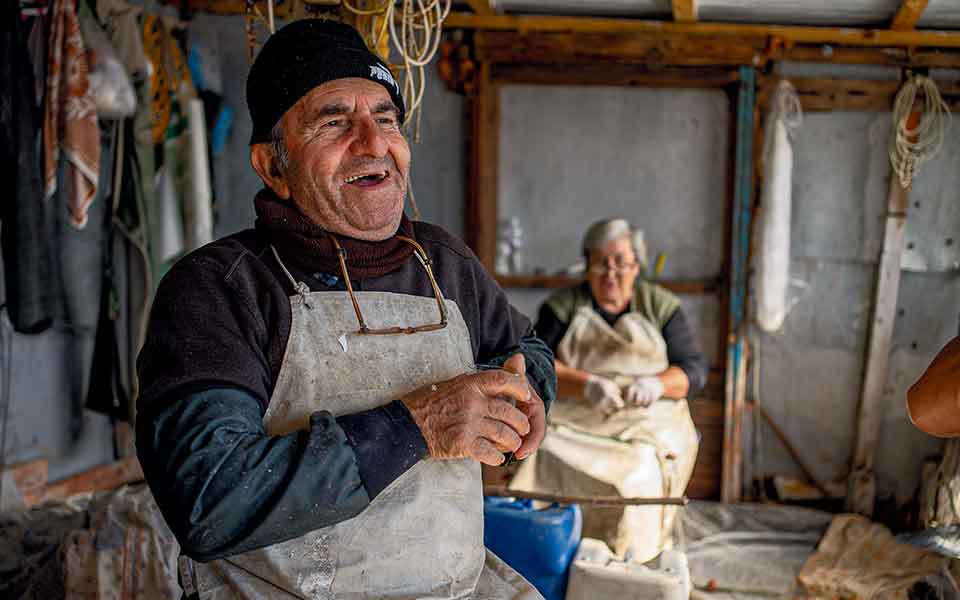
© Nikos Karanikolas
The Evros Delta is primarily important for the wintering of birds, both waders and waterfowl. Some species nest here in the spring, but the majority migrate from the north. “The Delta is Greece’s most important area for geese. Thousands of white-fronted geese winter here every year, including globally threatened species such as the red-breasted goose and the lesser white-fronted goose. It is also the most important area in Greece for the three species of European swans, particularly the rare Bewick’s swan, whose population can reach 11,000 individuals in a single year,” says environmentalist Eleni Makrygianni of the Natural Environment and Climate Change Agency’s Delta Evros and Dadia Management Unit.
Visitors are more impressed by the flamingos, pelicans, and storks (especially in the villages), but the presence of rare birds of prey such as sea eagles, spotted eagles, and golden eagles is equally important. More than 320 bird species have been identified, with approximately 70 of them nesting in the area, including iconic species such as the spur-winged plover, stone-curlew, marsh harrier, and ruddy shelduck. Because of its location and the value of its habitats, the Delta serves as an important stopover for migratory species.
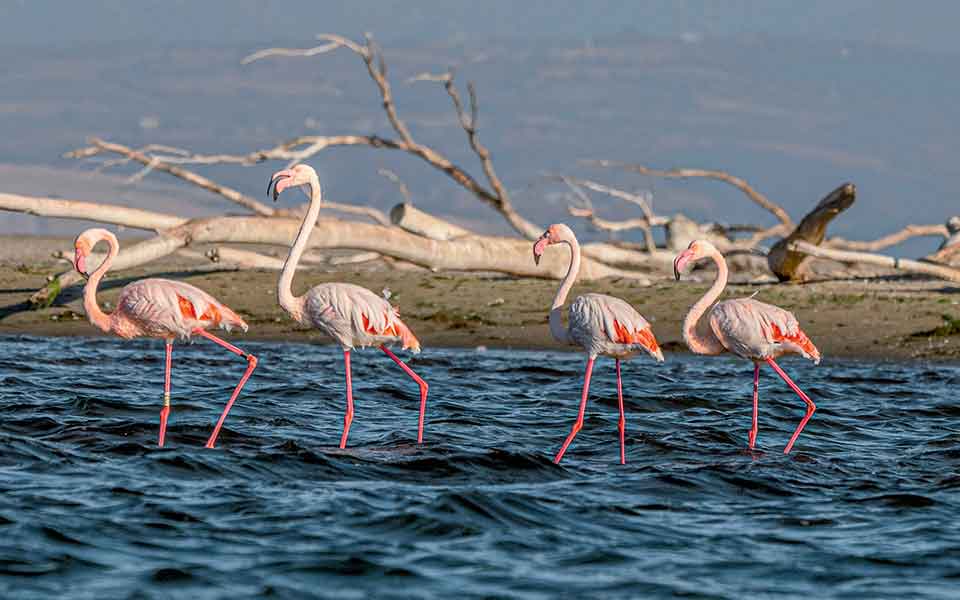
© Nikos Karanikolas
Until the 1950s, it wasn’t possible for people to enter the Delta. It was an inaccessible jungle teeming with jackals, wolves, and birds. Only a few adventurous fishermen and shepherds would venture there during the summer. The first researcher to study it was Swedish ornithologist B. Flach, who in 1954 published a paper that aroused the interest of European scientists. More studies followed, which highlighted its global importance and the need to protect it.
Meanwhile, MOΜΑ (Mixed Groups of Reconstruction Machines, a military construction company) opened roads, and land improvement works were carried out, including embankment construction, marsh drainage to create arable land, deforestation, and, later, the Alignment of the Evros River.
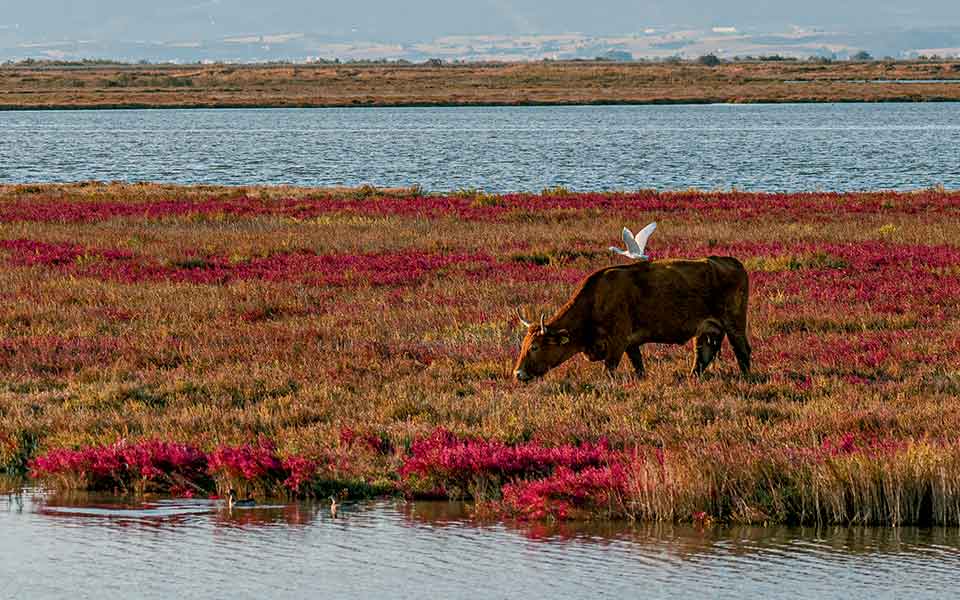
© Nikos Karanikolas
“North of Feres, the river splits into two branches: eastern and western. Another fork on the eastern branch, a few kilometers before its estuary, is where the borders were confirmed in 1926. The border between Greece and Turkey was established along the eastern branch, while the Alignment took place on the western branch. This was also when the network of artificial canals and pumping stations was created. This forever changed the image of the Delta as well as its hydrological balance. Important bird habitats were lost, and new problems emerged. Freshwater acts as a barrier against salinity. With drainage, seawater infiltrates higher and higher, resulting in high salinity levels in the fields. Proper water management is still an issue. Nevertheless, the Delta remains a healthy ecosystem,” says forest ranger Vasilis Ilias of the Management Unit.
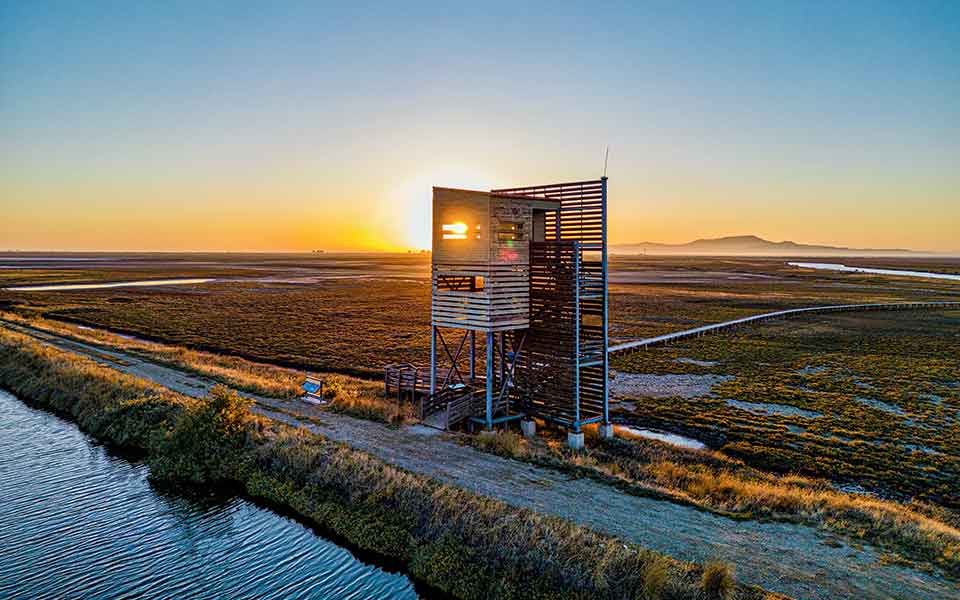
© Nikos Karanikolas
Numerous misguided interventions, such as drainage works and the degradation of the Drana lagoon, which also served as a fish farm, began to be remedied in the 2000s. Additionally, due to the absence of dams in the Greek-Turkish section, the Delta is alive and geomorphologically evolving. The river’s sedimentary materials alter the landscape, clogging the canals, while the sea depth remains shallow and filled with sandbars and sandbanks even at great distances from the shore. All this movement results in vast Posidonia oceanica meadows, while many species of birds nest or stop on isolated coasts and islets during migration. The sight of flamingos that appear to be walking on water is breathtaking.
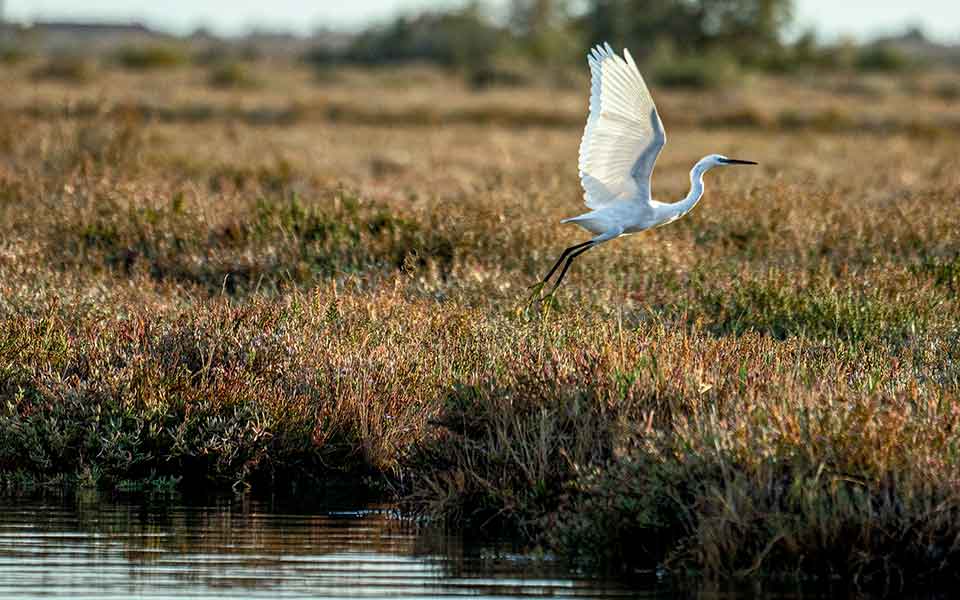
© Nikos Karanikolas
Irises, crowfoot, lavender, and tamarisk cover the flat expanses alongside the lagoons, where over 300 plant species have been identified. Willows, poplars, ash trees, and alder trees flourish near the river, where passage is prohibited for military reasons. Visitors are not permitted to travel by car in the strictly protected southern part of the Delta due to the “wildlife refuge,” and must be accompanied by members of the Management Unit or Christos Pashalakis, the only person currently organizing boat trips in the area. While hiking is permitted, everyone is required to show identification during the frequent checks carried out by the National Guardsmen.
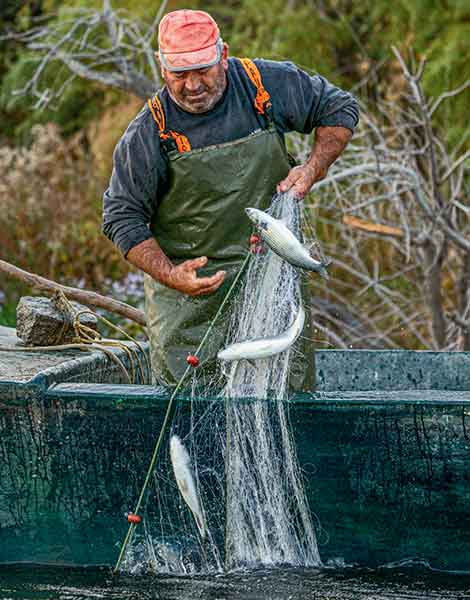
© Nikos Karanikolas
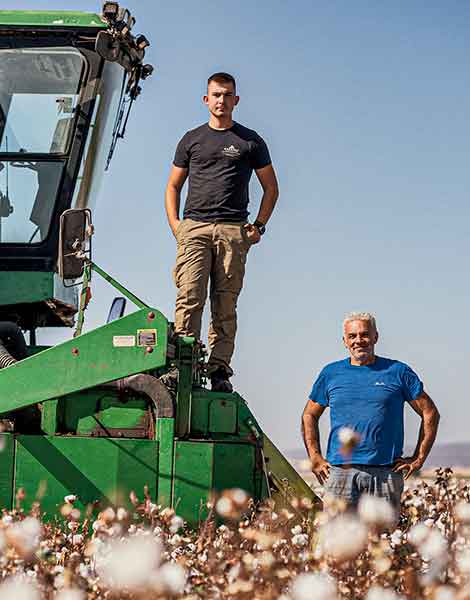
© Nikos Karanikolas
Flathead gray mullets, cotton, and Greek flags
Two-thirds of the deltaic plain are cultivated. Cotton, cereals, and beets are grown in the northern regional zone. A stone’s throw from the notorious fence, people work the land diligently and are required to adhere to the Codes of Good Agricultural Practice established to protect the ecosystem and birdlife. Birds, particularly geese and ducks, occasionally clear the fields of pests. On the other hand, livestock farming has declined and few cows can be seen in the area. Overgrazing is a problem, but so is undergrazing. Following a unique model of sustainability, the ecosystem requires controlled grazing to balance the growth of tamarisk and reeds.
There is more activity in the canals and in the sea. Despite the fact that 46 fish species have been identified, fishermen report a decline in catches. Gray mullet, seabass, bluefish, blue crabs, and, less frequently these days, mullet, cuttlefish, eels, and shrimps are caught using nets cast in fresh and salt waters among the reeds. Twenty fishermen remain active; in the past there were more than fifty.
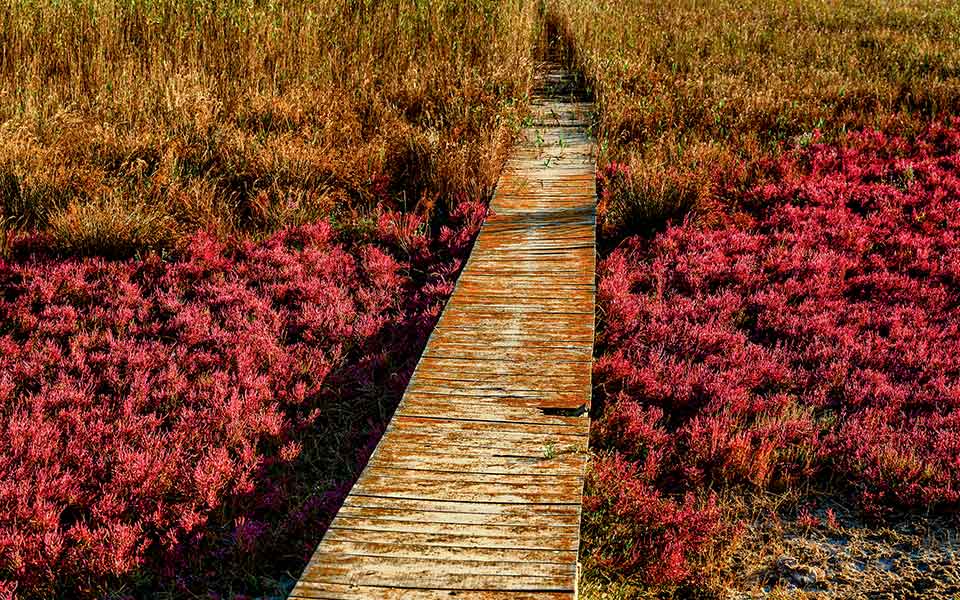
© Nikos Karanikolas
Sakis Harmanidis has been in and out of the Delta for fishing since 1978. Like most, he spends some nights in his stilt hut and some outside the Delta. He usually casts nets and darts in Alignment: “I cut the sea because the fish has fallen. I used to enter Turkey too, no one bothered us, now things have become wild, they take us “in” straight away and let’s get out of trouble,” he says and then describes: “In the morning I make my coffee and drink it in peace. Only the birds and the singing of the hodja can be heard from across the street. In the evenings I again hear the thin, delicious fish that come in the spring and leave in the fall. Well, that makes a peculiar noise in the water.”
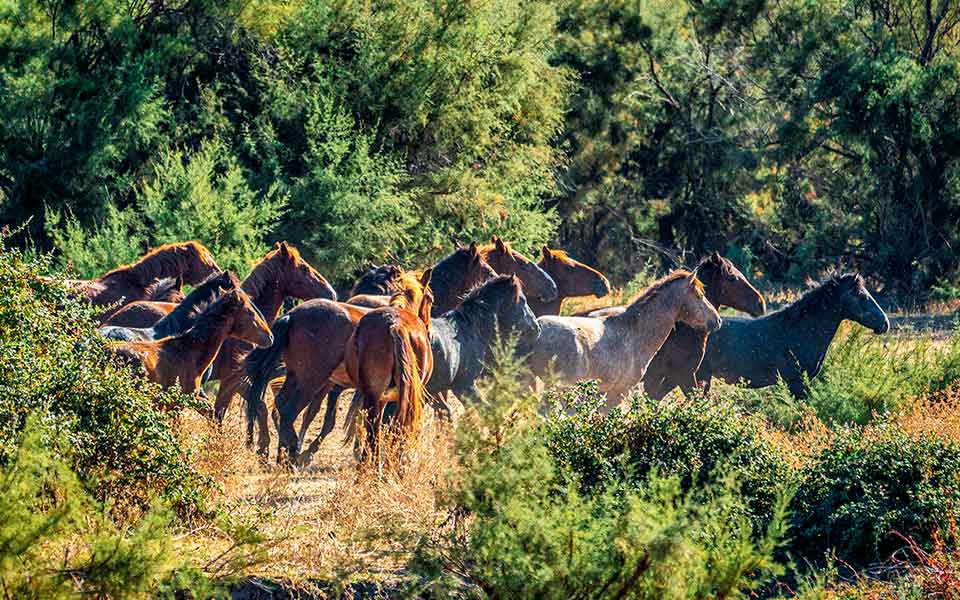
© Nikos Karanikolas
Indeed, the Turkish authorities often harass them. “They circle us in boats that have machine guns in front. It doesn’t take much for them to hook you and pull you in. They argue that these are not Greek waters. However, when the coastguard is out, they don’t approach us. Border guards often accompany us, waiting for us to gather the nets so we aren’t afraid,” says Nikos Papakostidis, who had dreamed of working at sea since he was a child, despite growing up in a family of farmers.
Despite his retirement, he refuses to leave the Delta, where he has fished for the past 55 years. He goes out every day with his wife Artemis, whom they call “the lady of the Delta”: “I’ve been here for forty-two years,” she says. “I can’t live without the sea. I stay for its beauty, its tranquility, and because there must be Greeks here. And if they get close, I’ll be the first to resist,” adds Nikos. As for the migrants they occasionally encounter at their door, Artemis explains: “We don’t want them to come, but when they do, we take care of them. Some are dangerous and cause damage to the huts, but others come to escape the war. My grandfather was a refugee; he came from across the sea. We are Greeks, not barbarians.”
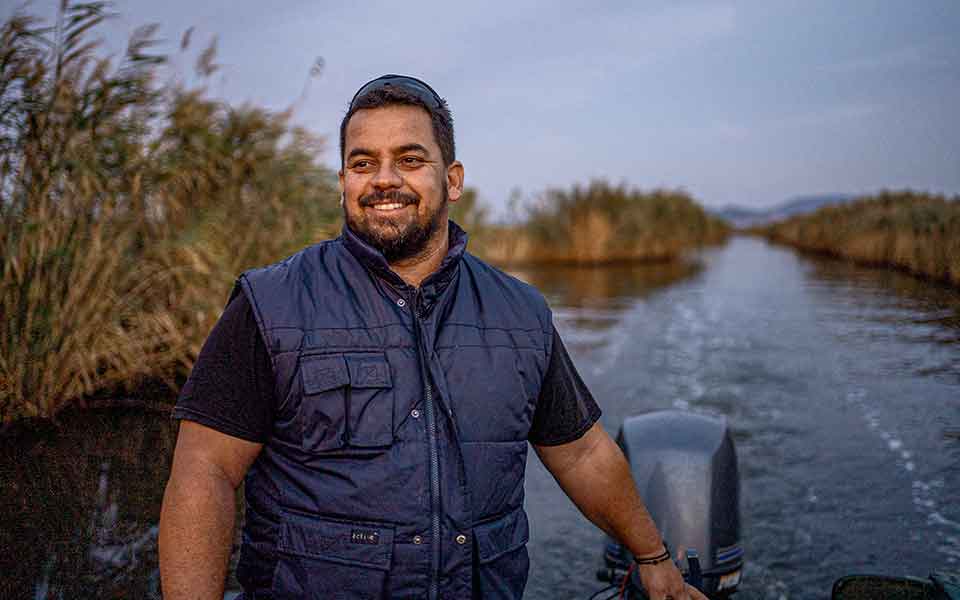
© Nikos Karanikolas
The wood and sheet metal huts where fishermen have set up households have been declared illegal and their removal has been proposed, and all the hut dwellers are already paying fines. It is prohibited to put up new ones, and the approximately 170 or so old ones are passed down from father to son. Fewer children take up fishing; they prefer to turn them into vacation homes.
“This is what I I’ve been looking forward to all week. In the hut we escape, relax, and have parties,” says Triantafyllos Batarlis, who keeps a hut with three of his friends. Others rent them out to hunters (hunting is permitted outside the center of the National Park and for specific species only). “They want to tear down the huts, but if we leave, the Turks will come to fish and take over the land; it doesn’t take much. They dispute the area, and they want the borders to reach the Alignment,” says Harmanidis, while Batarlis explains their position: “Our presence is a deterrent. Let them leave the existing ones, let no more be made. They have accepted this, but still take us to court.”
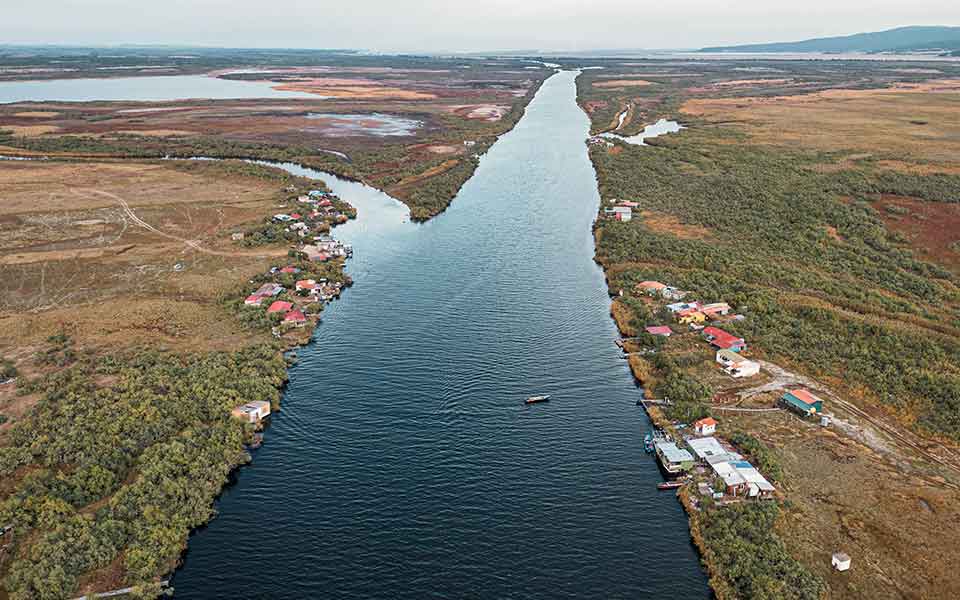
© Nikos Karanikolas
Who is right and who is wrong? In the Delta, you don’t speak much anyway; dealing with extreme views requires a strong stomach and a sense of humor. It’s better to just look at the winds and the tides, the debris that constantly transforms the landscape, the seaweed entangled in the reeds, the tamarisk next to the water lilies, and the fishermen who navigate the sandbanks with skill.
In the Evros Delta, you learn to think in dualities: to read the sky and the earth, to understand what the birds are saying and what the tracks in the sand mean. Is it a sandbank or a fish that lies beneath the water? You learn to pay attention. To tell the difference between Turkish canoes scaring birds away from rice fields and teals taking flight at the sight of a passing peregrine falcon, or between a hunter’s rifle and a soldier’s gun.
The view with Samothrace in the background is breathtaking as the sun sets. When it gets dark, all you can see are the huts flickering like candles and the lights of Alexandroupoli or Ainos in the distance. You can hear birds chirping, the murmur of the meagre on the seafloor, and the muezzin from “across the way.” However, unlike other wetlands, Evros is not peaceful; things are volatile here.
This article was previously published in Greek at kathimerini.gr.

